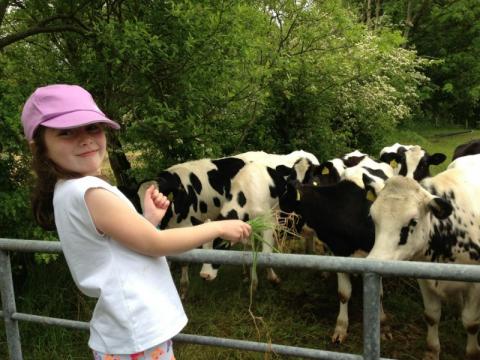Remember to 'wash your hands after visiting the farm'

Now that schools are finished for the summer and parents are thinking of activities to keep their children entertained, the Public Health Agency (PHA) is reminding families about the importance of washing hands after all outdoor activities, particularly after visiting the farm or farmyard settings.
All animals naturally carry a range of organisms, some of which can be transmitted to people. Some organisms which may be contracted on farms present a serious threat and can potentially cause severe infection, particularly in young children.
To reduce the risk of illness, both adults and children should thoroughly wash their hands using soap and water after they have handled animals or touched surfaces at the farm. Hands should always be washed before eating or drinking.
Antibacterial hand gels and wipes are not a substitute for washing hands with soap and water, as gels/wipes may be unable to remove contamination in the way that running water can. However, using such gels after hand washing with soap and water may further reduce the risk of picking up these infections.
Dr Lourda Geoghegan, Consultant in Health Protection at the PHA, said: “Farm animals often carry a range of organisms which can be passed to children and adults. These organisms can include serious infections such as E. coli 0157 which is very contagious, is easily passed from animals to children and then easily spread within the household.
“Hand washing with soap and water will reduce the risk of picking up infections which can be particularly harmful to young children. By being aware and by doing these simple things we can help to avoid illness and enjoy a fun day out.”
Visiting a farm is a very popular summer activity but it's important to remember that contact with farm animals carries a risk of infection; therefore parents need to supervise their children’s hand washing during and after visiting an open farm.
Please visit the PHA website www.publichealth.hscni.net/publications/hand-cleaning-technique for guidelines on hand washing techniques.
- People are infected with E. coli 0157 through consuming contaminated food or drink, handling contaminated animals or by contact with an environment contaminated with animal faeces.
- E. coli 0157 is very infectious, with only a few organisms capable of causing illness. The organism may produce toxins which damage the lining of the gut and cause bloody diarrhoea, abdominal pain, nausea and vomiting. The toxins can also damage the kidneys causing renal failure.
- In 2008, of the non outbreak cases of E. coli 0157 in Northern Ireland, nearly half had visited a farm just before their illness.
- In 2009 there was a major outbreak of E. coli 0157 associated with an open farm in Surrey involving 93 cases. This was the subject of an independent investigation – see www.griffininvestigation.org.uk/default.htm. Included among its many recommendations was the importance of thorough hand washing when visiting farms.
